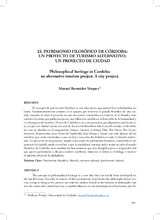El patrimonio filosófico de Córdoba: un proyecto de turismo alternativo. Un proyecto de ciudad
Philosophical heritage in Cordoba: an alternative tourism project. A city project
Autor
Bermúdez Vázquez, Manuel
Editor
UCOPressFecha
2021Materia
Patrimonio filosóficoFilosofía
Turismo cultural
Patrimonio cultural
Philosophical heritage
Philosophy
Cultural tourism
Cultural heritage
METS:
Mostrar el registro METSPREMIS:
Mostrar el registro PREMISMetadatos
Mostrar el registro completo del ítemResumen
El concepto de patrimonio filosófico es una idea nueva que apenas lleva trabajándose un lustro. Fundamentalmente consiste en la apuesta por fomentar el pasado filosófico de una ciudad, tratando de traer al presente no solo los autores vinculados a la historia de la filosofía, sino también las obras que pudieron ejercer una influencia notable en el desarrollo de la humanidad y en el progreso de las ideas. El caso de Córdoba es un caso particular, paradigmático podría decirse, ya que esta ciudad cuenta con uno de los acervos filosóficos más ricos del mundo, y ello dicho sin caer en absoluto en la exageración. Séneca, Lucano, el obispo Osio, Ibn Hazm, Ibn Firnás, Averroes, Maimónides, Juan Ginés de Sepúlveda, José Ortega y Gasset son solo algunos de los nombres que están vinculados a esta ciudad y cuya obra ha influido en toda la historia intelectual. La ejecución de un proyecto amplio y abarcador de patrimonio filosófico, convertirlo en un proyecto de ciudad, puede contribuir a que la ciudadanía conozca más y mejor no solo el pasado filosófico de Córdoba, sino también las herramientas que esta disciplina pone a disposición del que quiera aproximarse a ella para resolver conflictos, fomentar el debate y el diálogo y mejorar el espíritu crítico de la ciudadanía. The concept of philosophical heritage is a new idea that has hardly been developed for the last five years. Basically, it consists of the commitment to promote the philosophical past of a city, trying to bring to the present not only the authors linked to the historiy of philosophy, but also the works that could have had a notable influence on the development of humanity and the progress of ideas. The case of Cordoba is particular, it is a paradigmatic case, since this city has one of the richest philosophical backgrounds in the world, and this can be said without falling into any exaggeration. Seneca, Lucano, Bishop Osio, Ibn Hazm, Ibn Firnas, Averroes, Maimonides, Juan Ginés de Sepúlveda, José Ortega y Gasset are only some of the names that are linked to this city and whose work has influenced the whole humanity. A broad and comprehensive project of philosophical heritage must be a city project, and can contribute to the citizens’ knowledge of not only Cordoba’s philosophical past, but also of the tools that this discipline makes available to those who wish to approach it in order to resolve conflicts, encourage debate and dialogue and improve the critical spirit of citizens.

